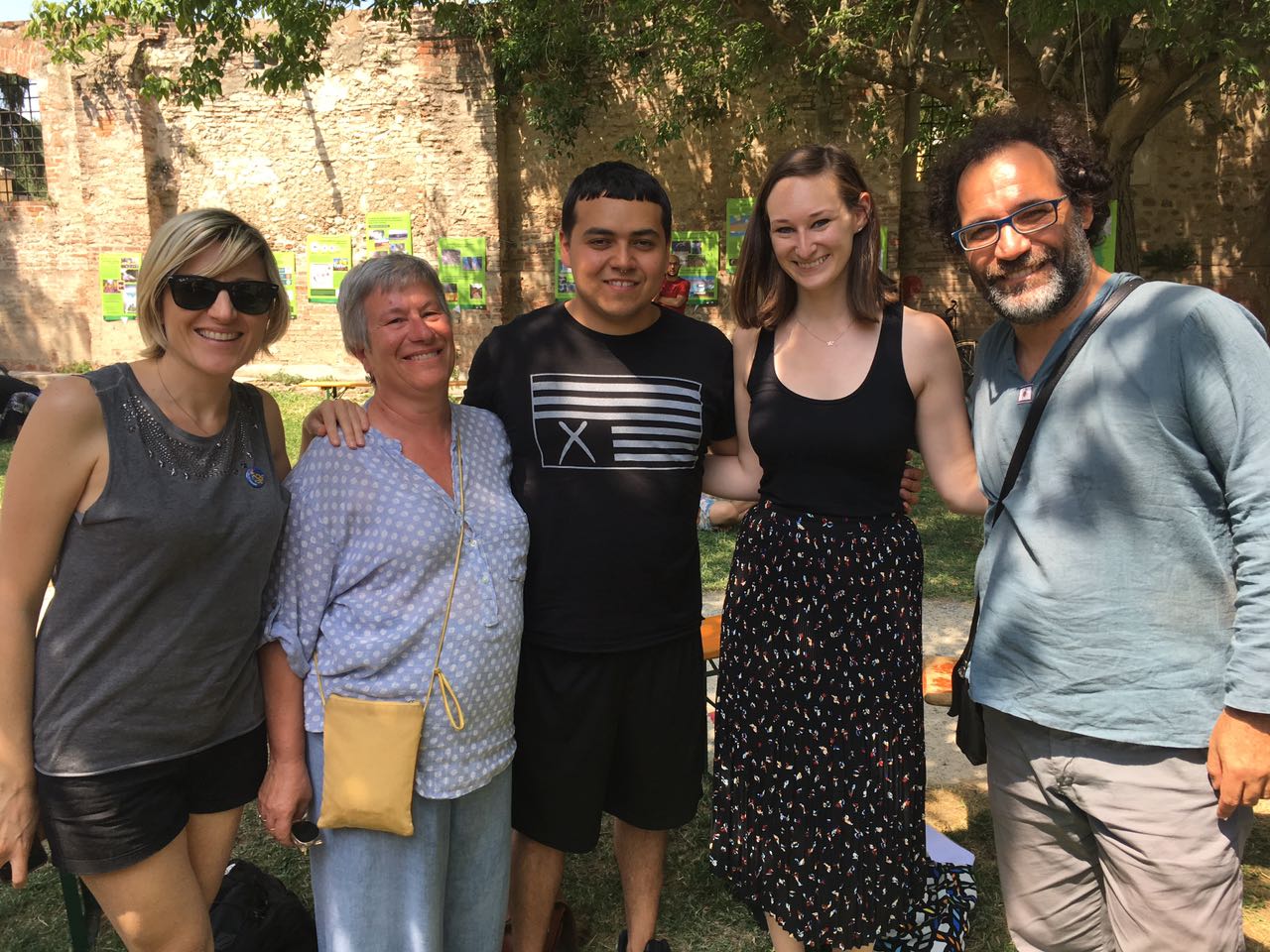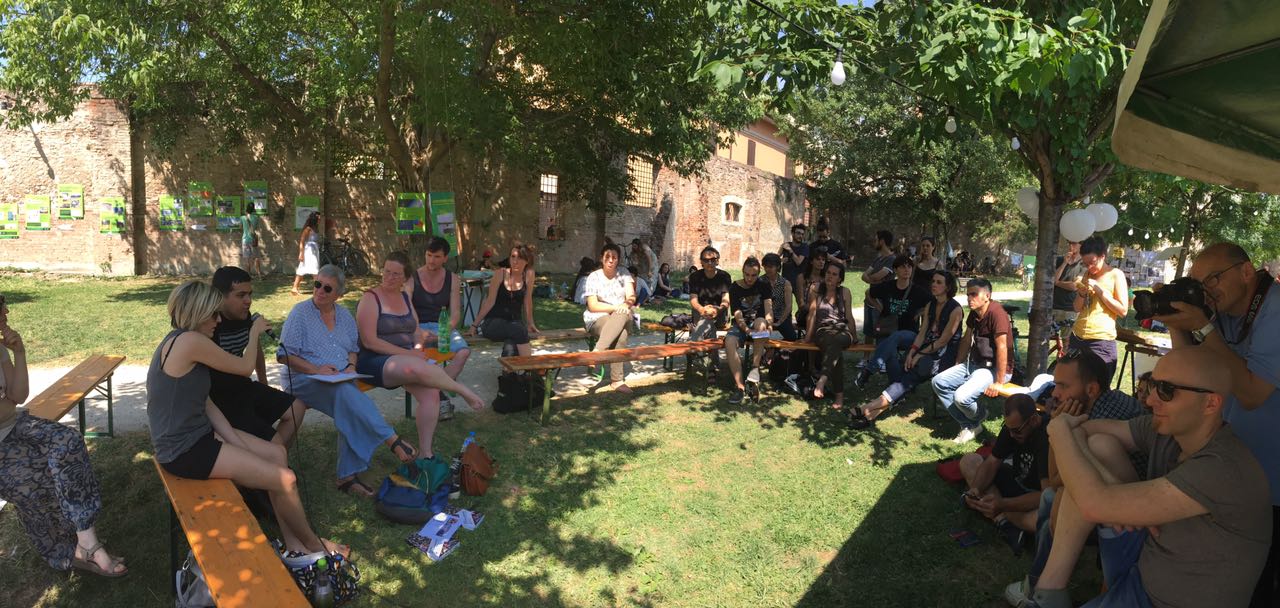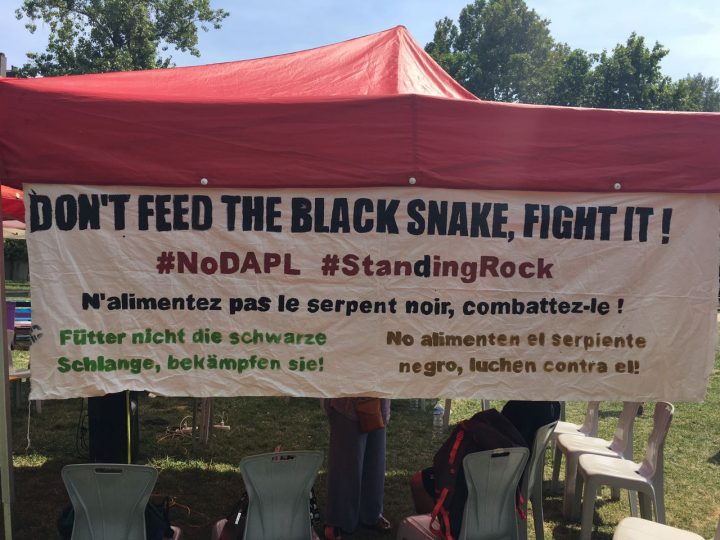Held yesterday at the September 11 Park in Bologna, Italy, this event organized by Pressenza, Women’s March Milan and “G7M-Ambiente alla base, non al vertice” was one of the many initiatives during a counter-summit on the environment ending today with a Critical Mass demonstration and a march.
After an introduction by Francesco Luca Basile, one of the organizers of the three-day event, the workshop on “How to build networks between independent nonviolent journalists and activists” began. Anna Polo, of the Italian edition of Pressenza, spoke on the many lights, both big and small, that illuminate this dark moment in time, which is full of violence and injustice. The most recent example is Jeremy Corbyn’s extraordinary resurgence in the UK election, a clear demonstration that mainstream media is not omnipotent, and that their defamatory campaigns may actually have the opposite effect. It is important to remain coherent, not to be discouraged and to make strong proposals, which, as we have seen, have obtained great popular support, especially among young people.
The journalist remarked on the inspirational model provided by the Standing Rock movement, with its ability to unite different people (Native American tribes, indigenous communities around the world, activists, and veterans). She described its social and environmental actions that use the method of nonviolence and its strong spiritual component.
Liane Arter, of Women’s March Milan, provided a living demonstration of the Standing Rock activists’ ability to engage, as well as of the international network that has formed around their movement. As a local expression of Women’s March Global, Women’s March Milan is a group of women and men committed to equality, diversity and inclusion. They act as promoters of progressive initiatives in opposition to the Trump administration and the growth of the far-right in the world. These objectives spurred the group to join the #DefundDAPL divestment campaign. The campaign has been active for months, aiming to stop the Dakota Access pipeline by pushing the banks that finance it to withdraw their investments in a project that destroys the environment and violates the rights of indigenous peoples. In Italy, the campaign, along with Resistance Events Italy, focused on Intesa SanPaolo through two online protests on Twitter and Facebook and two open letters signed by over fifty organizations, including Greenpeace Italia. The bank’s response was generic and unsatisfactory, an attitude that was repeated at the recent Bologna protest. This time it was not only virtual, as it was carried out on the morning of June 10th in front of a Bologna subsidiary of Intesa SanPaolo. No bank representative would receive the third letter, which was presented during the protest and signed by Wasté Win Young, Rachel Heaton, Rafael Gonzalez, Nataanii Means and their allies.
This part was followed by the young rapper Rafael Gonzalez aka Tufawon, one of the Water Protectors traveling in Europe over these weeks to promote the divestment campaign and strengthen ties with groups and movements from various countries. He spoke in English with the aid of excellent translation by Carla Agrario. After months in the forefront of the resistance at Standing Rock, and after being forcible evicted from the Octet Sakowin Camp in February, he devoted himself to the #DefundDAPL campaign and to the fight against other oil pipelines. Rafael then focused on the crucial role played by social and independent media in supporting struggles, like those of Native Americans. He recalled brave frontline journalists with the activists at Standing Rock who were crucial to providing witness of what was happening. A network of mutual support has been built, with information, live streaming and shared videos that can reach many people. It is a real threat to the news lobby and corporations, which are putting their powerful resources in place to hinder live broadcasts. A key objective therefore becomes finding advanced forms of technology that can overcome this attempt. Researching these alternative methods to continue fighting could be a good idea for other movements, said the young water protector.
Two representatives of the No TAP movement, who oppose the Trans-Adriatic pipeline part of the so-called South Gas Corridor, concluded the meeting. This battle has been going on for six years, and it goes far beyond the clamor recently sparked the removal of thousands of olive trees. Indeed, it is often talked about in the mainstream media with obvious falsehoods, which have never been corrected despite specific requests in this regard. Despite repeated statements by various Italian ministers, the technical feasibility of this project, which has never seen an environmental impact report, is simply not there, but evidently the political will is.
This is a further example of the urgent need to contrast information that is manipulated to serve powerful interests with free and independent journalism that can dialogue with activists in different fields and find ways to create reciprocal support.
Translation from Italian by Peter Luntz

Carla Agrario, Anna Polo, Rafael Gonzalez, Liane Arter and Francesco Luca Basile











